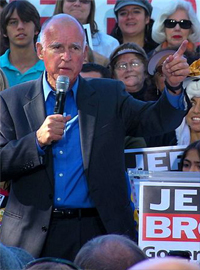| Public Unions, Collective Bargaining Drive California’s Deficit |
 |
|
By Ashton Ellis
Thursday, November 29 2012 |
Flush with an estimated $6 billion in new annual tax revenues after voters passed Proposition 30, California Governor Jerry Brown is claiming victory over the state’s chronic budget deficit. But Brown’s failure to reform two of the main drivers of overspending – public employee unions and their collective bargaining rights – will mean continuing deficits are here to stay. A new study by the Pacific Research Institute explains why. In 2011, outside research cited in the PRI study revealed that California government workers enjoy a compensation premium 30 percent higher than their in-state private sector counterparts. Half of that premium comes from the generous retirement benefits negotiated by public employee unions. These taxpayer-funded windfalls include early retirement options that let able-bodied union members stop working in their 50s to collect as much as 90 percent of their final salary each year for the rest of their lives. Moreover, because of provisions that allow members to “spike” their final salary amount by working exorbitant amounts of overtime during their last year, the cost to taxpayers of a public employee’s retirement can easily result in a decades-long boon based on abusing the system. The remaining 15 percent premium stems from the immensely stronger job security government workers have in relation to peers in the private sector. Simply put, you can’t fire a public employee for poor performance. Civil service laws and byzantine union grievance procedures protect the incompetent from accountability. That kind of job security is worth a lot of money, and it shows. You’ll be hard pressed to find any vested California public employee willing to leave a job even if they hate it. The salary and benefits are just too good. So, while union spokesmen argue, correctly, that wages are slightly lower for public employees compared to similar jobs in the private sector, they refuse to justify an overall compensation package that is 30 percent richer than anything available to similar workers in the business world. But how could they? At the same time California’s public compensation premium is rising, the value of public services is declining. As noted in the PRI study, the achievement gap is widening between California’s public school system and other states. Investment in infrastructure like roads, bridges, highways, airports, ports and water facilities “has declined significantly in part because the compensation and retirement costs of current and retired employees is overburdening the state.” In other words, unions and their bloated compensation packages are crowding out investment in the very public goods the state budget is supposed to fund. Yet California voters were sold a very different story by Governor Brown to pass Prop 30. In the run-up to the election, Brown claimed that higher taxes were necessary to fill the budget shortfall, or else he would be forced to cut funding to schools, health care providers and the mentally ill. What he didn’t say is that failure to reduce the excessively generous 30 percent compensation premium means leaving untouched two of the biggest drivers in state overspending. According to Wayne Winegarden, the author of the PRI study, California’s laws regulating public employee union activity need immediate reform. As mentioned above, California allows union members to spike – i.e. distort – their final salary, allowing them to artificially inflate the value of their retirement. State law also permits public employees to strike, and to force the formation of a union through card check; an end-run around the democratic principle of a secret ballot. The other cost driver is the legal requirement to bargain collectively with public employees. Originally, collective bargaining was justified by union members in private companies on the grounds that they deserve to get more of the profits they help generate. But as James Sherk of the Heritage Foundation observes, “Government workers, however, don’t generate profits. They merely negotiate for more tax money.” With expensive campaign advertising to support Brown’s Prop 30, that’s exactly what California’s public employee unions did with the state’s voters. Having won at the polls, it’s too bad that $6 billion in new tax receipts every year won’t do a thing to stop unions from growing their compensation packages, while crowding out essential services. |
Related Articles : |
























